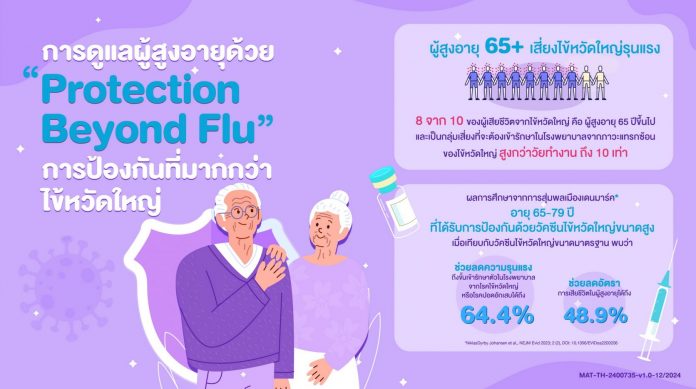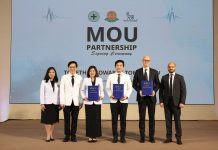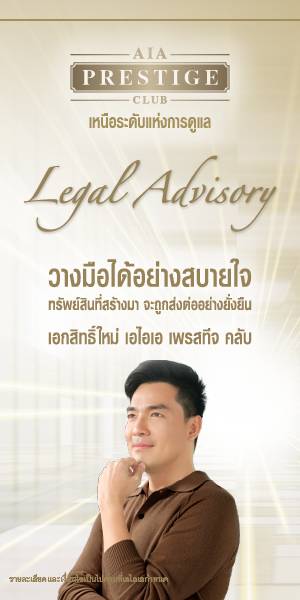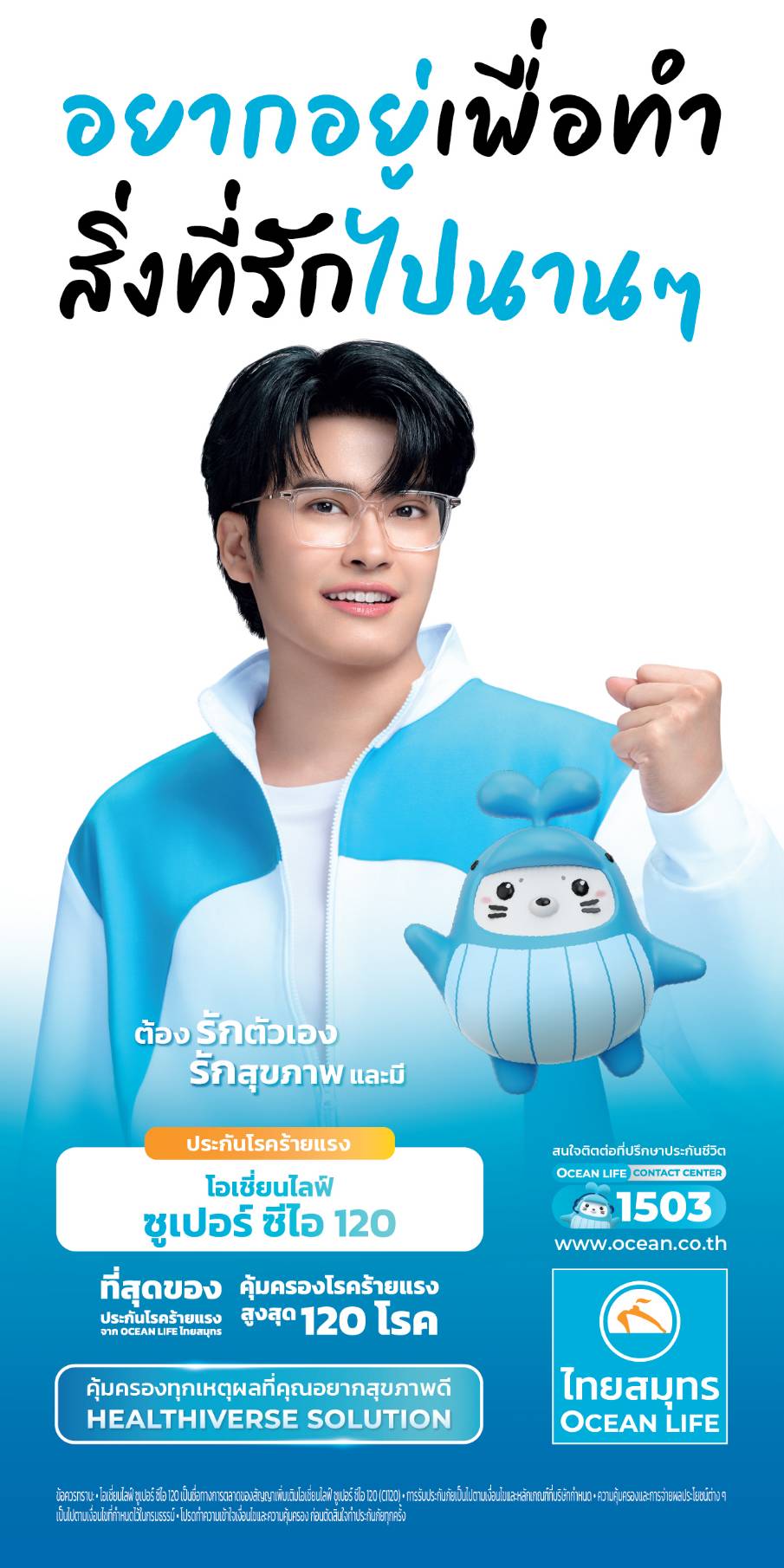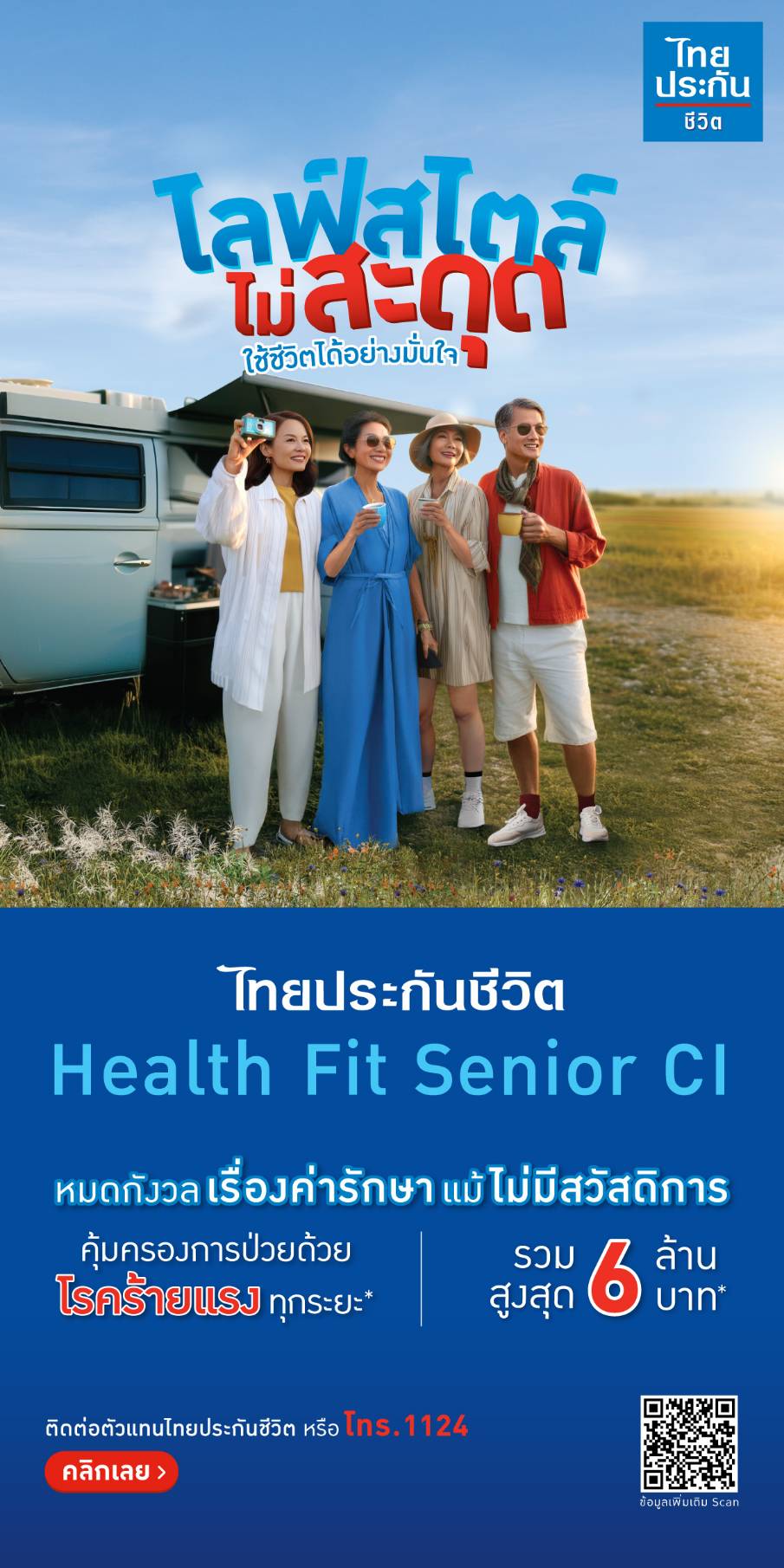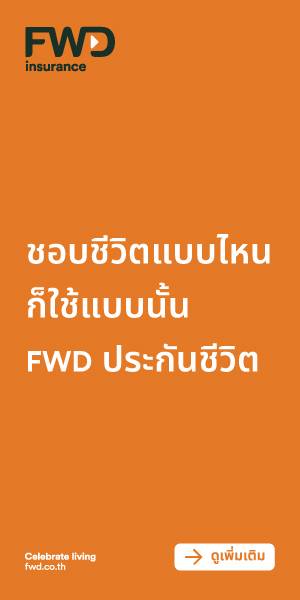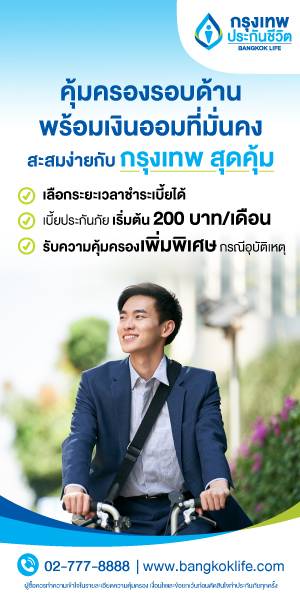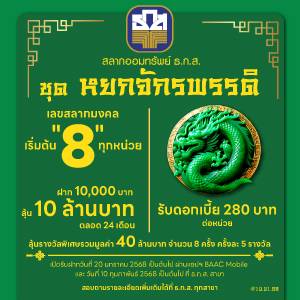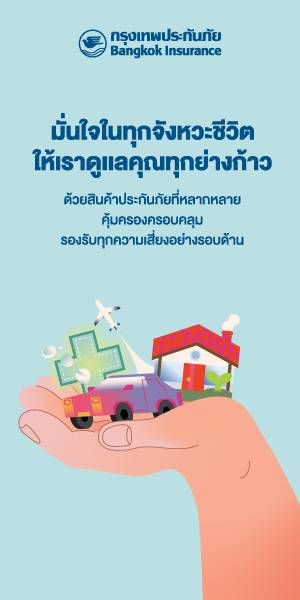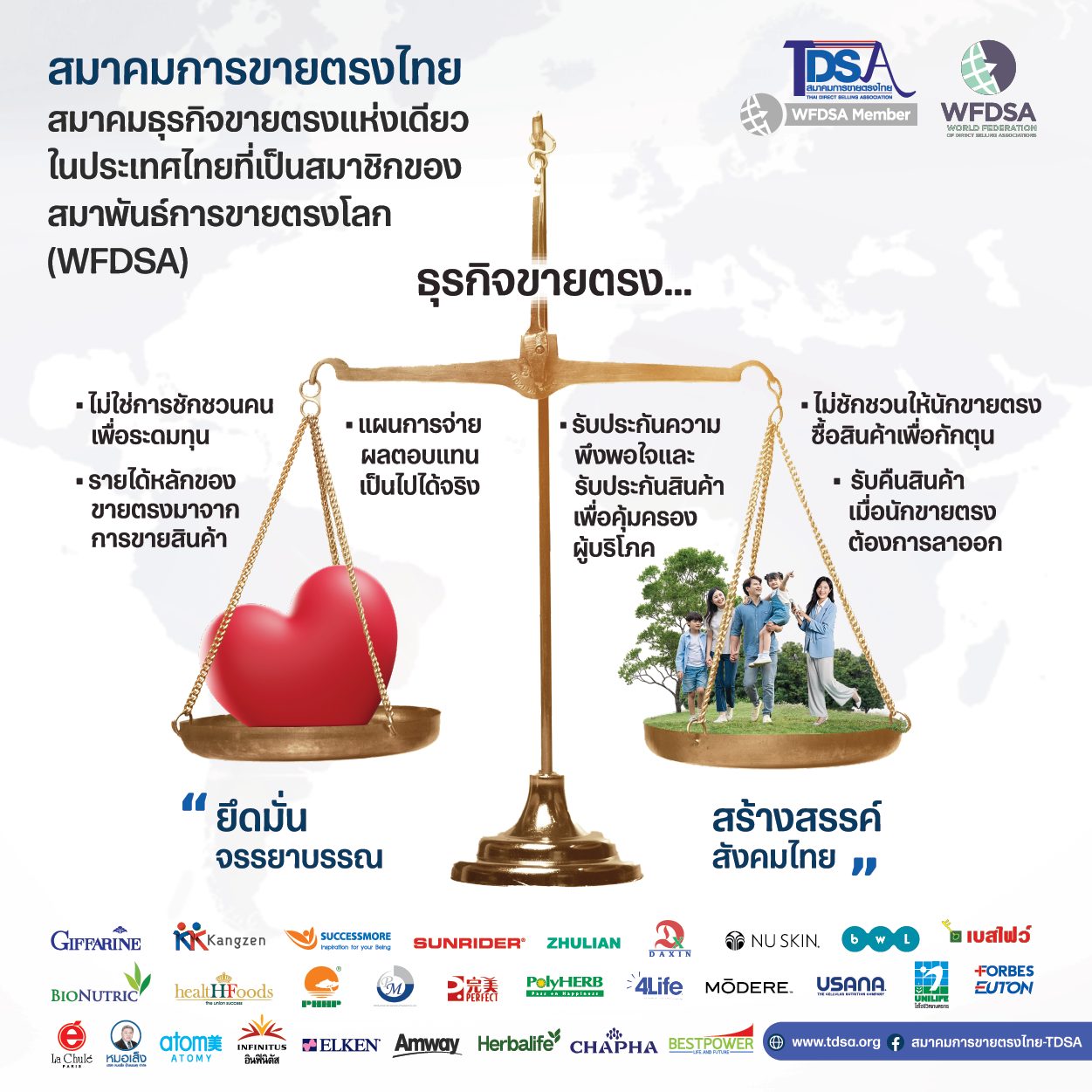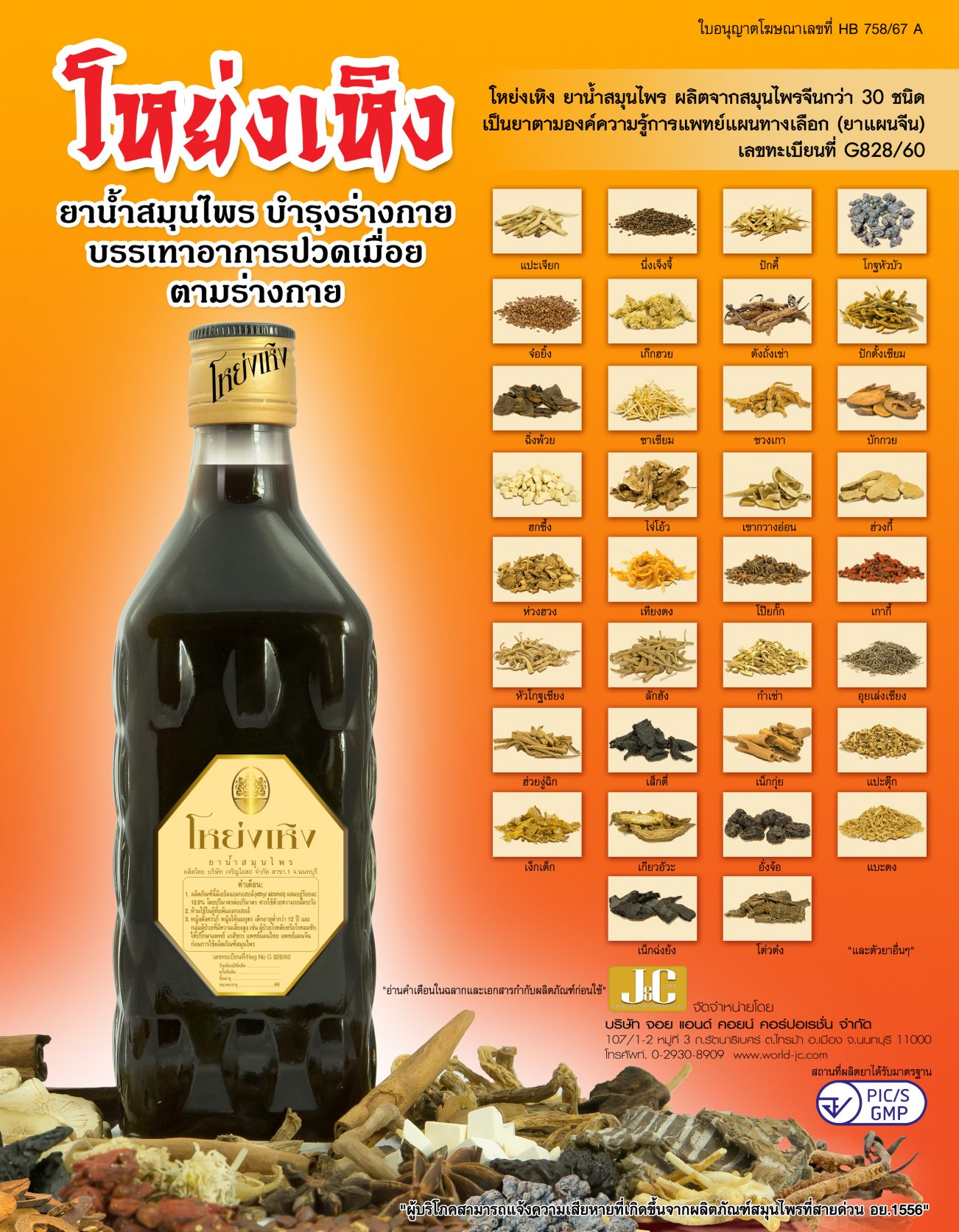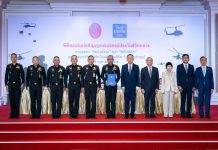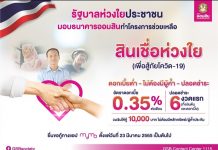• เผยผลการศึกษา* การป้องกันด้วยวัคซีนไข้หวัดใหญ่ขนาดสูง ช่วยลดอัตราการเสียชีวิตในผู้สูงอายุได้ถึง 48.9% และลดการนอนโรงพยาบาล 64.4%
• 8 จาก 10 รายของผู้เสียชีวิตจากไข้หวัดใหญ่คือผู้สูงอายุ 65 ปีขึ้นไป
• ผู้สูงอายุเสี่ยงป่วยหนักจากไข้หวัดใหญ่มากกว่าคนวัยทำงานถึง 10 เท่า
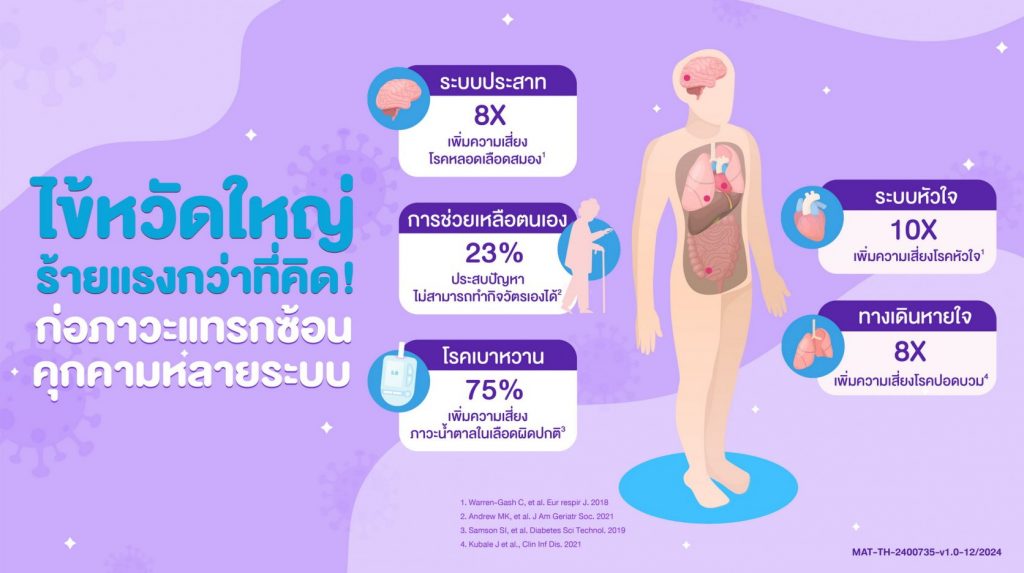
เมื่อเร็วๆ นี้ ผู้เชี่ยวชาญกว่า 400 คนจากทั่วโลกและภูมิภาคเอเซียตะวันออกเฉียงใต้ได้เข้าร่วมสัมมนาทางวิทยาศาสตร์ระดับภูมิภาคเกี่ยวกับไข้หวัดใหญ่ พร้อมแนะนำการดูแลป้องกันผู้สูงอายุจากไข้หวัดใหญ่ Protection Beyond Flu “การป้องกันที่มากกว่าไข้หวัดใหญ่”
ในการประชุมได้นำเสนอข้อมูลสำคัญในหลายประเด็น ได้แก่ ภาระโรคไข้หวัดใหญ่ในผู้ป่วยที่มีโรคร่วม ผลกระทบของไข้หวัดใหญ่ในภูมิภาคเอเชียตะวันออกเฉียงใต้ กลยุทธ์การเพิ่มอัตราการรับวัคซีนในประเทศ และวิธีการประเมินวัคซีนไข้หวัดใหญ่ที่ดีขึ้นเพื่อให้แน่ใจว่าได้เลือกตัวเลือกที่มีประสิทธิภาพ การอภิปรายเหล่านี้ชี้ให้เห็นถึงความจำเป็นในการรับมือกับไข้หวัดใหญ่โดยการให้การป้องกันที่มากขึ้นเพื่อลดภาระโรคและปรับปรุงคุณภาพชีวิตของผู้สูงอายุ
ไข้หวัดใหญ่ไม่ใช่เพียงแค่หวัดธรรมดา แต่สามารถส่งผลกระทบรุนแรงต่อระบบอวัยวะสำคัญและนำไปสู่ภาวะแทรกซ้อนร้ายแรง เช่น ปอดบวม หัวใจวาย และโรคหลอดเลือดสมอง จากข้อมูลขององค์การอนามัยโลก (WHO) พบว่าในแต่ละปีทั่วโลกมีผู้ป่วยไข้หวัดใหญ่อาการรุนแรงประมาณ 3-5 ล้านราย และมีผู้เสียชีวิตจากภาวะแทรกซ้อนรุนแรงประมาณ 290,000 – 650,000 ราย สำหรับประเทศไทย ตามข้อมูลจากกรมควบคุมโรค กระทรวงสาธารณสุข ณ วันที่ 2 พฤศจิกายน 2567 มีรายงานผู้ป่วยไข้หวัดใหญ่ 603,000 ราย เพิ่มขึ้น 25% จากปี 2566 ที่มีผู้ป่วย 484,000 ราย และมีผู้เสียชีวิต 47 ราย
ผู้สูงอายุมีความเสี่ยงที่จะต้องเข้ารับการรักษาในโรงพยาบาลจากภาวะแทรกซ้อนของไข้หวัดใหญ่สูงกว่าวัยทำงานถึง 10 เท่า ในขณะที่ 8 จาก 10 รายของการเสียชีวิตที่เกี่ยวข้องกับไข้หวัดใหญ่พบในผู้ที่มีอายุมากกว่า 65 ปี
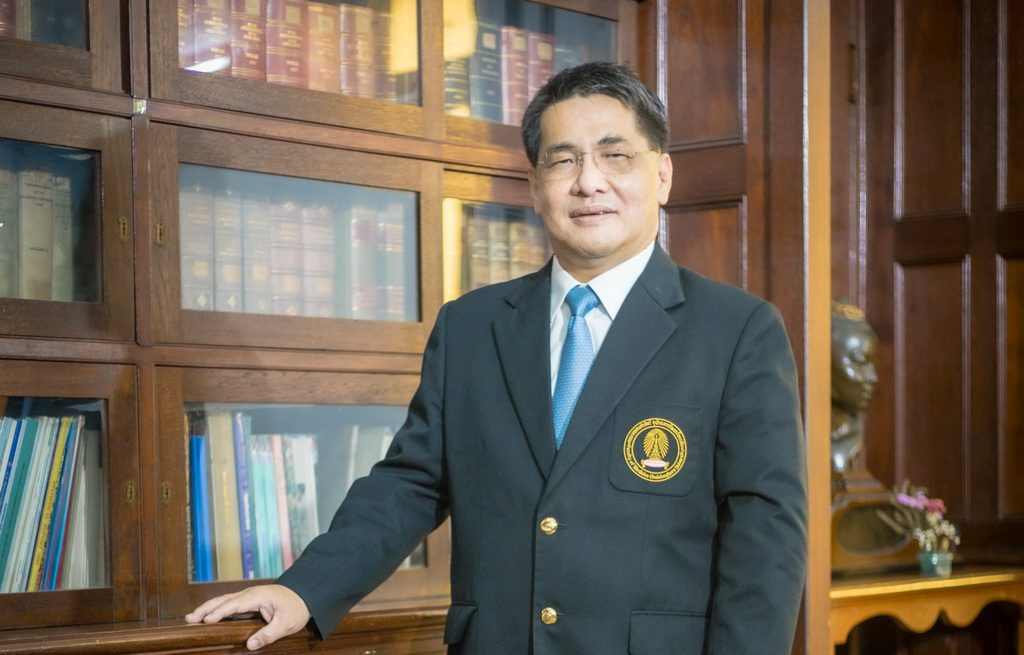
ศ.นพ.ธีระพงษ์ ตัณฑวิเชียร ผู้ช่วยผู้อำนวยการฝ่ายวิชาการ และรักษาการหัวหน้าฝ่ายบริการและวิจัยคลินิก สถานเสาวภา สภากาชาดไทย ได้ร่วมการอภิปรายในเวทีและแบ่งปันความก้าวหน้าของการฉีดวัคซีนไข้หวัดใหญ่ในประเทศไทย “ในประเทศไทย ความตระหนักถึงภัยของไข้หวัดใหญ่และภาระโรคได้เพิ่มอย่างมีนัยสำคัญ
โดยภาครัฐได้ริเริ่มโครงการฉีดวัคซีนป้องกันไข้หวัดใหญ่ให้แก่ประชาชนโดยไม่เสียค่าใช้จ่าย ตั้งแต่ปีพ.ศ. 2554 เริ่มจากปีละ 1-2 ล้านโดสแก่ผู้สูงอายุและกลุ่มเสี่ยง ปัจจุบันเพิ่มขึ้นเป็น 6 ล้านโดสต่อปี เมื่อรวมกับ 3 ล้านโดสจากตลาดภาคเอกชน อัตราความครอบคลุมของการได้รับวัคซีน (VCR) จะอยู่ที่ 12% ของประชากร และ 30% ของประชากรผู้สูงอายุ ซึ่งถือว่าสูงในภูมิภาคของเรา แต่ยังต่ำกว่าเป้าหมายอัตราความครอบคลุมของการได้รับวัคซีนที่กำหนดโดยองค์การอนามัยโลกที่อยู่ที่ 75% สำหรับกลุ่มเปราะบาง ประเทศไทยมีเป้าหมายที่จะเพิ่มการรับวัคซีนเป็น 12 ล้านโดสในปีต่อๆ ไป เพื่อปกป้องประชากรกลุ่มเปราะบางได้ดียิ่งขึ้น”
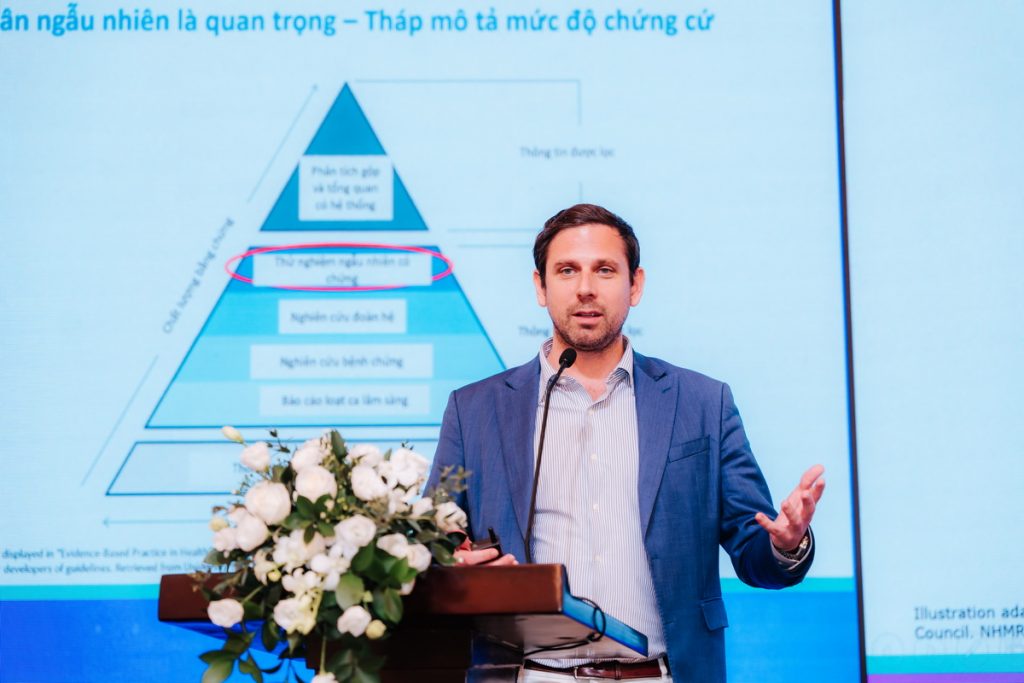
ผลกระทบที่แท้จริงของไข้หวัดใหญ่มักถูกประเมินต่ำกว่าความเป็นจริง เนื่องจากการรายงานที่ต่ำกว่าความเป็นจริงและภาระจากภาวะแทรกซ้อนที่เกี่ยวข้องกับไข้หวัดใหญ่ มีการประมาณการว่าภาระทางเศรษฐกิจระดับชาติจากไข้หวัดใหญ่อยู่ที่ประมาณ 3.04 พันล้านบาทต่อปี โดยค่าใช้จ่ายเฉลี่ยต่อการรักษาแบบผู้ป่วยนอกอยู่ที่ 7,632 บาท ในขณะที่ค่ารักษาพยาบาลแบบผู้ป่วยในเฉลี่ยอยู่ที่ 178,000 บาท** เมื่อประเทศไทยก้าวเข้าสู่สังคมผู้สูงวัยโดยสมบูรณ์ โดยมีประชากรอายุมากกว่า 60 ปีคิดเป็น 20% ของประชากรทั้งหมด จึงมีความสำคัญอย่างยิ่งที่จะให้ความสำคัญกับการป้องกันผู้สูงอายุเพื่อลดค่าใช้จ่ายด้านการดูแลสุขภาพ
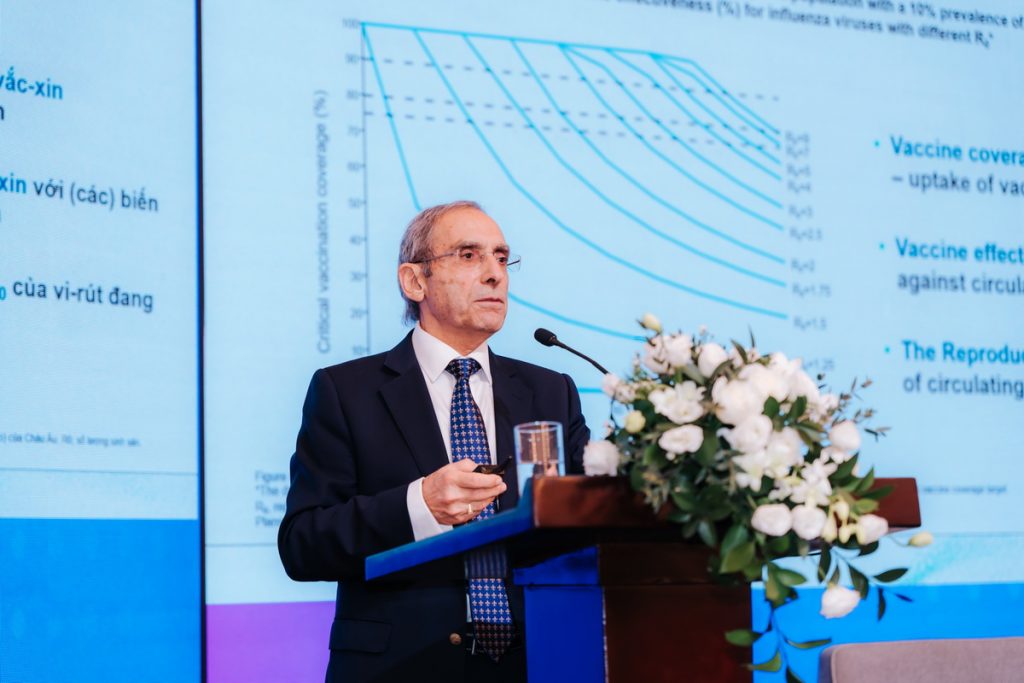
Dr George Kassianos ผู้เชี่ยวชาญด้านวัคซีนและการสร้างภูมิคุ้มกันจากสหราชอาณาจักร เน้นย้ำถึงความสำคัญของการฉีดวัคซีนไข้หวัดใหญ่ในผู้สูงอายุว่า “แม้ว่าอัตราความครอบคลุมของการได้รับวัคซีน (VCR) จะมีความสำคัญ แต่เมื่อเร็วๆ นี้เราสังเกตว่าอัตราการเข้ารับวัคซีนในผู้สูงอายุลดลงเรื่อยๆ ปัจจัยสำคัญเกิดจากความลังเลในการรับวัคซีน ความกังวลเกี่ยวกับผลข้างเคียง ความสงสัยเกี่ยวกับประสิทธิภาพของวัคซีน และการขาดข้อมูลเกี่ยวกับความรุนแรงของไข้หวัดใหญ่และภาวะ แทรกซ้อน จึงมีความจำเป็นที่จะต้องสร้างความตระหนักและให้ความรู้แก่ประชากรผู้สูงอายุและผู้ดูแล เกี่ยวกับความสำคัญของการฉีดวัคซีนไข้หวัดใหญ่เพื่อให้แน่ใจว่าพวกเขาได้รับการป้องกัน”
เพื่อเพิ่มประสิทธิผลในการนำเสนอวิธีการเสริมสร้างภูมิคุ้มกันแก่ผู้สูงอายุ การพัฒนาคุณภาพการออกแบบการทดลองทางคลินิกและยกระดับมาตรฐานหลักฐานทางการแพทย์ จึงเป็นสิ่งสำคัญมาก โดยเน้นการสร้างหลักฐานจากระเบียบวิธีการศึกษาที่มีคุณภาพสูง รวมถึงการทดลองแบบสุ่มและมีกลุ่มควบคุม (RCTs) ร่วมกับหลักฐานจากการใช้งานจริง
“ในการวัดประสิทธิผลของวัคซีน สิ่งสำคัญคือต้องพิจารณาผลลัพธ์ทางคลินิกด้วยระเบียบวิธีที่แข็งแกร่ง ซึ่งสามารถพัฒนาให้ดียิ่งขึ้นได้ด้วยการผสมผสานการสุ่มเข้ากับหลักฐานจากการใช้งานจริง จากการศึกษา ผมได้สุ่มพลเมืองเดนมาร์คอายุ 65 – 79 ปีที่ได้รับวัคซีนไข้หวัดใหญ่ พบว่าวัคซีนไข้หวัดใหญ่ขนาดสูงช่วยลดความรุนแรงถึงขั้นเข้ารักษาตัวในโรงพยาบาลจากโรคไข้หวัดใหญ่หรือโรคปอดอักเสบได้ถึง 64.4% และช่วยลดอัตราการเสียชีวิตในผู้สูงอายุได้ถึง 48.9% เมื่อเทียบกับวัคซีนไข้หวัดใหญ่ขนาดมาตรฐาน ในสถานการณ์จริง” กล่าวโดย Prof. Tor Bering-Sorensen หัวหน้าการศึกษาเกี่ยวกับประสิทธิภาพวัคซีนไข้หวัดใหญ่ขนาดสูงในผู้สูงอายุในประเทศเดนมาร์คมาหลายปี
ไข้หวัดใหญ่ สามารถส่งผลกระทบรุนแรงต่อระบบอวัยวะสำคัญและนำไปสู่ภาวะแทรกซ้อนร้ายแรง อาทิ เพิ่มความเสี่ยง 10 เท่า ในการเกิดโรคหัวใจ, 8 เท่า ในการเกิดหลอดเลือดสมอง หรือเพิ่มความเสี่ยงที่จะเป็นเบาหวานถึง 75% จึงควรป้องกันผู้สูงวัย ซึ่งเป็นกลุ่มเปราะบาง ด้วยวัคซีนไข้หวัดใหญ่ที่มีประสิทธิภาพ ปลอดภัย และเหมาะสมตามช่วงวัย ซึ่งนอกจากจะป้องกันจากไข้หวัดใหญ่แล้วยังสามารถลดความรุนแรงจากภาวะแทรกซ้อนได้ด้วย ซึ่งหมายถึง Protection Beyond Flu
NiklasDyrby Johansen et al., NEJM Evid 2023; 2 (2), DOI: 10.1056/EVIDoa2200206
**Kiertiburanakul et al (2020); Journal of Healthcare Organization, Provision and Financing, Volume 57:1-14
Experts Suggested Elevating Elderly Care with “Protection Beyond Flu”
• Research in Denmark* reveals that the elderly protection with High-Dose Influenza Vaccine could reduce flu and pneumonia hospitalizations by 64.4% and lower mortality rates by 48.9%
• Approximately 80% of deaths related to influenza occur in individuals over the age of 65.
• Seniors are ten times more likely to be hospitalized due to complications from the flu.
Over 400 global and regional experts convened at a regional scientific seminar on influenza, focusing on improving health outcomes for adults through vaccination. At the forum, they advocated for advancing elderly protection with the ‘Protection beyond Flu’ standard of care. Compelling data were presented on several urgent topics, including the burden of flu in patients with comorbidities, the impact of flu in South-East Asia, strategies to increase vaccine uptake, and methods to better evaluate flu vaccines to ensure the selection of the most effective options. These discussions underscored the urgent need to enhance flu protection to reduce its burden and improve the lives of the elderly.
Influenza is not just a common cold; it can wreak havoc across major organ systems and lead to serious complications, such as pneumonia, heart attack, and stroke. According to the World Health Organization (WHO), there are approximately 3-5 million severe cases of influenza globally each year, with around 290,000 – 650,000 deaths due to serious complications from influenza. In Thailand, according to the MoPH’s Department of Disease Control, as of November 2, 2024, 603,000 influenza cases have been reported, a 25% increase from 2023’s 484,000 cases, with 47 deaths.
Elderly are 10x more likely to be hospitalized from flu complications while 8 out of 10 influenza associated deaths are among those aged over 65 years old.
Prof. Terapong Tantawichien, Head of Division of Research Clinic, Queen Saovabha Memorial Institute, Thai Red Cross Society, joined the panel discussion and shared the progress of flu vaccination in Thailand. “Thailand has significantly increased awareness of influenza’s burden, initiating a free vaccination program in 2011. Initially providing 1-2 million doses to the elderly and high-risk groups, this has now increased to 6 million doses annually. Combined with 3 million doses from the private market, the total vaccine coverage rate is 12% of the population and 30% of the elderly, which is high for our region, but still lower than the WHO’s 75% VCR target for vulnerable groups. Thailand aims to increase vaccine uptake to 12 million doses in the coming years to better protect the vulnerable population.”
The true impact of influenza is often underestimated due to underreporting and the burden of flu-related complications. It is estimated that the national economic burden of influenza is approximately 3.04 billion THB annually. The average cost of an outpatient visit is 7,632 THB, while hospitalization costs average 178,000 THB**. As Thailand becomes a silver-aged society with 20% of the population being over 60 years old, it is crucial to prioritize elderly protection to reduce healthcare expenditure.
Dr George Kassianos, UK Specialist in Vaccinations & Immunization, emphasized on importance of Flu vaccination among elderly. “While the vaccine coverage rate (VCR) is crucial, we have observed a recent decline in VCR among the elderly due to vaccine hesitancy. Concerns about side effects, doubts about vaccine effectiveness, and a lack of information about the severity of flu and its complications are contributing factors. It is essential to raise awareness and educate the elderly population and their caregivers as well as people in the clinical groups at risk on the importance of flu vaccination to ensure they are protected.”
To ensure the most reliable and impactful healthcare solutions, it’s crucial to prioritize high-quality clinical trial design and set higher standards for medical evidence. By focusing on generating evidence from robust study methodologies, such as randomized controlled trials (RCTs) combined with real-world evidence, we can confirm the value of vaccines in providing protection.
“To measure vaccines’ effectiveness, it is important to consider clinical outcomes with robust methodology which can be even improved by combining this randomization with real-world evidence. From my study, using RCT in real world in adults aged 65-79, High-Dose Influenza Vaccine provided higher protection against flu and pneumonia hospitalization by 64.4%, and reduced the mortality by 48.9% compared to a standard-dose flu vaccine,” said Prof. Tor Biering-Sorensen, who headed the Research on effectiveness of high-dose influenza vaccines in elderly over the years in Copenhagen, Denmark.
Influenza poses significant risks to vital organs and can lead to serious health complications. Notably, it can increase the risk of heart disease by 10x, stroke by 8x, and diabetes by 75%. To mitigate these risks, it is crucial to protect elderly individuals with an effective, safe, and age-appropriate influenza vaccine. This vaccination not only guards against influenza but also helps reduce the severity of potential complications, thus “Protection Beyond Flu”.
- NiklasDyrby Johansen et al., NEJM Evid 2023; 2 (2), DOI: 10.1056/EVIDoa2200206
**Kiertiburanakul et al (2020); Journal of Healthcare Organization, Provision and Financing, Volume 57:1-14
#
MAT-TH-2400727-V1.0/12-2024
For media information and inquiries, please contact:
Ms. Khuntira Natvatananon, Senior PR Consultant
Tel: 094-1545698, E-mail: khuntira4pr@gmail.com



